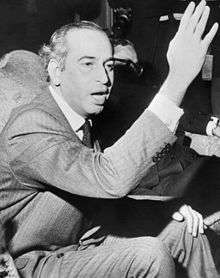Pakistani general election, 1977
| | ||||||||||||||||||||||||||||||||||||||||||||||||
| ||||||||||||||||||||||||||||||||||||||||||||||||
| ||||||||||||||||||||||||||||||||||||||||||||||||
| ||||||||||||||||||||||||||||||||||||||||||||||||
 |
| This article is part of a series on the politics and government of Pakistan |
| Constitution |
|
Pakistan General elections of 1977 were held in Pakistan on 7 March 1977 to elect the 200 parliamentarians (for both houses (Senate and National Assembly) for the Parliament of Pakistan.[1] The general elections were the second elections held in the history of the country as well as the first after the split of the country.
The elections resulted in out-sparked violence, civil disobedience and massive protests held by Avami National Party and her ally Pakistan National Alliance. Whilst negotiations between Bhutto and the Opposition where still going on, The elections invited the confrontation and intervention of Pakistan Armed Forces in national politics which led the ouster and dismissal of ruling prime minister Zulfikar Ali Bhutto which led the end of his government in 1977. (see Operation Fair Play) The elections were also the last partisan elections until the parliamentary elections held in 1988 shortly after the death of President and military dictator General Zia-ul-Haq. Although, the third elections were also held in 1985 but were non-partisan elections which formed the technocratic government led by military-appointed Prime minister Mohammad Junejo but he was dismissed and ousted by then-President and military dictator General Muhammad Zia-ul-Haq in 1988. Mr Bhutto decided to negotiate matters with the PNA. Negotiations began on 3 June and went through 13 rounds. A little before midnight on 3 July the two sides reached an agreement, leaving a few minor points for Mr Bhutto to consider and accept. During the day on 4 July he decided to accept all of the PNA's demands. However, even though both parties agreed to hold fresh election, Zia Ul Haq overthrew the government.
Motives and campaign
The elections were held earlier than originally planned, and were expected to be held in the second half of 1977.[2] However, on 7 January 1977, Bhutto appeared on national television, announcing the elections would be held earlier, and started his political campaign shortly after appearing on national television.[2] On 10 January, Election Commissioner of Pakistan Justice Sajjad Ahmad Jan announced the election schedule and declared 19 and 22 January as the last date for receipt of nominations for the Parliament and Provincial Assemblies, respectively.[2]
Bhutto responded aggressively, immediately issuing party tickets to his workers. Unlike the 1970 elections, when Pakistan Peoples Party mainly banked on socialistic slogans, this time Bhutto also relied on political heavyweights, issuing tickets to feudal lords and other influential members.[2] Bhutto himself held public meetings all over the country, and to get further support from the common man, he announced labour reforms on 4 January, and on 5 January, a second set of land reforms.[2] The attendance in the public meetings was amazing in all parts of the country, especially in interior Sindh and Punjab.[2] Bhutto's motives for holding elections earlier was that not to give sufficient time to the opposition to make decisions and arrangements for the forthcoming elections.[2]
The PNA had become a big problem for Pakistan Peoples Party that was targeting Peoples Party on a number of occasions.[2] Throughout the elections, the PNA failed justify their plans for the country but instead targeted the Peoples' Party, concentrating on misdeed, alleged corruptions (although there were no evidences that linked to Bhutto), financial mismanagement, heavy expenditures on administration and disastrous economic policies evidenced by inflation.[2]
Electoral preparations
The Election Commission entered the registry of 30,899,052 voters, commissioned two hundred and fifty five Returning officers (RO) to manage voting system of the polling offices established in entire country. Surprisingly, the elections resulted the supermajority of Pakistan Peoples Party and Zulfikar Ali Bhutto, securing 155 seats out of 200
The result was a victory for the Pakistan People's Party, which won 155 of the 200 elected seats, including 19 that were uncontested as the Pakistan National Alliance boycotted the Balochistan elections due to ongoing military operations.
Outcomes
On 7 March 1977, the Election Commission announced the result in which Pakistan Peoples Party won the largest landslide victory in Pakistan's electoral history, winning 155 out of 200 seats in the Parliament. . The Pakistan National Alliance (PNA) secured only 36 seats and eight seats on each of province's legislative assemblies, but the PNA had not contested all the seats some parties boycotting elections in parts of the country. The PNA failed to secure any seats from industrial cities such as Lahore. in Karachi secure 80% seat . and Rawalpinidi, where the PNA had arranged the massive demonstration and big public gatherings and processions. These results were in stark contrast to the widespread predictions that although Bhutto would win the election, but not by a wide margin that the results suggested.[3]
Overall, the PPP won 60% of votes, a supermajority in the parliament, voting figures showing the success of the peoples party candidates often surpassed the actual number that turned up for voting. In numerous constituencies in Punjab, where Bhutto faced the strongest opposition, Bhutto's candidates returned with over 95% of the vote. Observers noticed that in a polling offices were Alliance's candidates were strong, the polling was alleged to have been blocked for hour. Observers, both in national and international, quickly pointed out that the results in key constituencies were issued directly from the Prime Minister's office.
Popular unrest
When the results were announced, a great ire on Bhutto was raised by Alliance's leader Abdul Vali Khan, accusing Bhutto for systematically rigging the elections. The Alliance boycotted the assemblies sessions, staging massive demonstration in the country. Vali Khan demanded immediate resignation of Bhutto, chief election commissioner, and as well as the government, proposing the idea of holding new elections under the supervision of Supreme Court of Pakistan. Bhutto refused the demands, Vali Khan and the Alliance decided to bring their party workers onto the streets, to break law deliberately, and to confront the police and the Federal Security Force, Bhutto's commissioned security forces. Alliance leaders called upon the people to stage countrywide strikes and organise protest marches. The followers fully responded to the call and a full-fledged political movement started, during this episode, the business community wholeheartedly joined Alliance. The Alliance used mosques and churches to stimulate the masses and tried to create an impression that they were only working for the enforcement of Nizam-i-Mustafa. They criticised the socialistic attitude of Bhutto and alleged that he had lost his faith in Islam. The ulema whipped up emotions for a Jihad to save Islam, which they thought was in danger from an evil regime. The bar associations across the country also began to register their strong protest against the electoral fraud and denounced the post-election policy of repression.
Results
| Party | Votes | % | Seats | +/– |
|---|---|---|---|---|
| Pakistan Peoples Party | 10,148,040 | 60.1 | 155 | +74 |
| Pakistan National Alliance | 6,032,062 | 35.7 | 36 | New |
| PML (Qayyum) | 1 | −8 | ||
| Other parties | 709,081 | 4.1 | 0 | – |
| Independents | 8 | −8 | ||
| Women and minority seats | – | – | 16 | – |
| Total | 16,889,183 | 100 | 216 | -84 |
Economic Effects
The Law and Order situation created by rioting by the PNA cost the economy $765 million and exports fell by 35%
Martial Law
Bhutto used the force of repression to curbed down the Alliance but soon came to conclusion that it was not possible. Therefore, Bhutto tried to use the options of dialogue by holding talks with the Alliance leaders. The Alliance demanded the 50% representation in the government, release of their party workers and leaders, and demanded new elections before 14 August. On 4 July 1977, then-director general of Military Intelligence Major-General Khalid Mahmud Arif revealed the military's plot to overthrow Bhutto, urging Bhutto to "rush the negotiations before its too late". The next day, Bhutto accepted all demands of Alliance and the stage was set for a compromise. Bhutto immediately travelled to Saudi Arabia and United Arab Emirates, further putting the negotiations behind and the Alliance termed his tour as "dilatory tactics". On 5 July 1977, Chief of Army Staff General Muhammad Zia-ul-Haq, supported by Chief of Naval Staff Admiral Mohammad Shariff, imposed Martial Law and sent Bhutto behind the bars. Shortly, General Zia announced: "Had an agreement reached between the opposition and the Government, I would certainly never have done what I did...". Although his statement was dismissed by General Khalid Mahmud Arif in 1979.
References
- ↑ Dieter Nohlen, Florian Grotz & Christof Hartmann (2001) Elections in Asia: A data handbook, Volume I, p673 ISBN 0-19-924958-X
- 1 2 3 4 5 6 7 8 9 Story of Pakistan. "General Elections 1977". January 1, 1977. Story of Pakistan, 1977 elections. Retrieved 10 March 2012.
- ↑ Talbot, Ian (1998). Pakistan, a Modern History. NY: St.Martin's Press. pp. 240–1.
The reality seems to be that a certain PPP victory was inflated by malpractice committed by local officials, which may have affected 30–40 seats.

